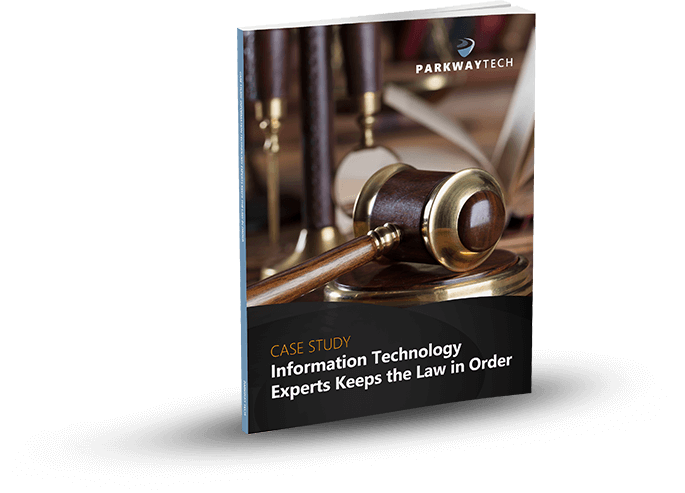14 Ways Small Law Firms Tackle Cyber Threats
Law practices manage volumes of sensitive client information, and they’re attractive targets for hackers. Opportunistic cyber-criminals are especially drawn to smaller and medium-sized law firms and other organizations where they are more likely to find IT systems that are less well protected.
Protecting attorneys and their clients, prevention of intrusion by phishing, email hacking, ransomware, spyware, sensitive data leaks, and other security issues is the focus of Managed IT Services for law firms. Below is a list of 14 ways to protect your firm, clients, and employees from cyber-threats, and other essential information to help you improve IT security for your law firm.
14 Tools for Data Protection
Keeping small law practices secure from cyber threats involves taking the necessary measures to reduce risk in some areas of a firm’s information technology. Risks include breaches to data confidentiality, data loss, and downtime due to hacking, virus and other disabling IT network events.
As part of an evaluation of your firm’s current level of cyber-security, an assessment of your methods of storing and transmitting sensitive data should be performed. Essentials include:
- Strong passwords that are automatically prohibited from reuse
- Multi-factor authentication at all points possible
- Hard drive and backup drive encryptions
- Password protection on sensitive document
- files Email attachment encryptions
- Avoiding discussing sensitive issues in non-encrypted emails
- Secure data storage (either certified GDPR-compliant cloud-based, or on-premises)
- Faxing secure documents using a standard fax machine, not e-faxing
- Diligently maintaining awareness of whether or not you are using an https site
- Routine staff training on identifying phishing and (“spear phishing”) other cyber-threats
- Execute routine backups
- Retain e-filing receipts from the court and confirmation emails
- Keep software updated
- Have an independent IT systems threat assessment
The Most Common Ways Cyber-Criminals Penetrate Network Systems of Law Firms
1. Phishing / Email Hacking
Today’s attorneys and staff use email, as well as shared document workspaces like DocuSign and Dropbox, which connect users’ email accounts. Meanwhile, hackers are busy developing their phishing methods to access these and other online accounts of law firms.
- Example:Hackers have designed their color schemes and graphics to mimic login screens.
- Example: A phishing trick at least one hacker has used to gain access is emailing requests for law firm employees to log in to online document storage and view a file.
- Example: Hackers have sent fake PDF files that appear to be from a law firm. When the recipients clicked on the documents, they were redirected to the hackers’ phishing site.
After a phishing attack, the first step is to quickly change all passwords for email accounts, and file sharing services or other online tools connecting the firm’s email accounts. Employing a two-factor authentication process adds an extra layer of security.
If clients’ information has probably been compromised, then the firm must inform them.
Law firm employees must be vigilant about identifying fake email requests. Cyber-criminals are becoming more sophisticated all the time in creating them.
2. Ransomware
Hackers using ransomware sometimes succeed in locking down files or computer systems and forcing their owners to pay to regain control of them.
- Example: A hacker has threatened to use wiper-ware to delete files if money was not paid promptly.
Law firm employees who receive threats that files will be deleted if money is not received quickly enough should not pay the ransom. Instead, report the incident immediately and work with IT experts in file recovery.
3. Data Leaks
Law firms with weak policies on information security are at increased risk of having sensitive information being made public by hackers.
- Example: A hacker may acquire law firm client’s or employee’s confidential information and broadcast it, perhaps on Twitter through a folder./li>
Artificial intelligence (AI) software may be used to help isolate weaknesses in a law firm’s IT network and identify various user behaviors that can make hacking more likely to occur.
Legal Malpractice Charges Due to Insufficient Computer Security in Law Firms
Law firms have a significant responsibility in keeping their voluminous confidential files secure, whether their information storage is on premises or in the cloud. Allegations of legal malpractice have become a problem for firms found operating without adequate file security measures in place.
- Example: A firm that had not been hacked was accused of allowing a client’s information to be exposed through vulnerabilities in the network, and received notice to prioritize cybersecurity.
The ABA’s 2017 Legal Technology Survey revealed that 22% of law firms had either been hacked or had data breaches during that year. That percentage is up from previous years.
Parkway Tech, Winston-Salem NC
Parkway’s team of North Carolina network security experts afford local small to medium-sized law firms state-of-the-art cyber-security to protect data, files, systems, and attorney’s reputations. The centerpiece of Parkway’s Managed IT Services for law firms; our legal IT specialists focus on implementation, monitoring, and management of your network and IT systems security. We apply maximal preventive measures to block existing and ever-emerging and evolving cyber-threats.
For More Information About Cybersecurity For Law Firms
For more information about IT security for legal practices, contact Parkway Tech at (336) 310-9888 any time, to schedule an appointment with a legal IT Managed Services specialist. Ask for a no-obligation systems assessment.
Can Your Legal IT Services Firm Keep Law & Order With Your Practice’s Technology?

Learn how Parkway’s Legal IT Services helps firms across North Carolina achieve better results.
Click Here
Download Our Free Report



